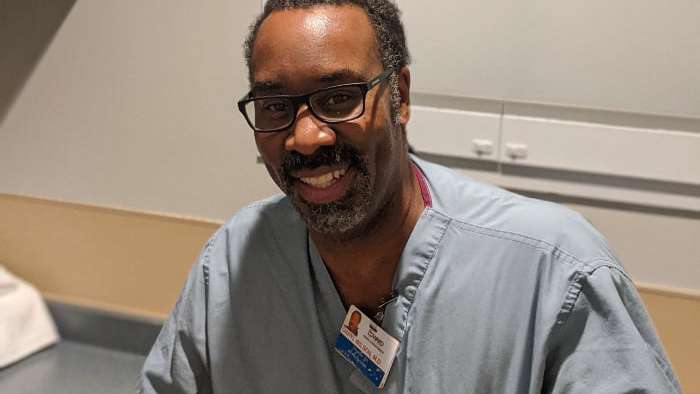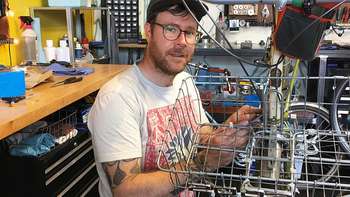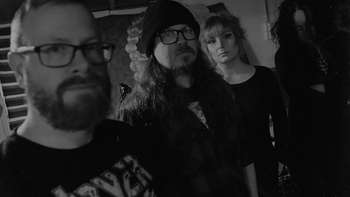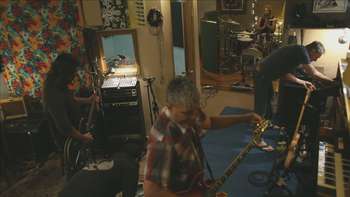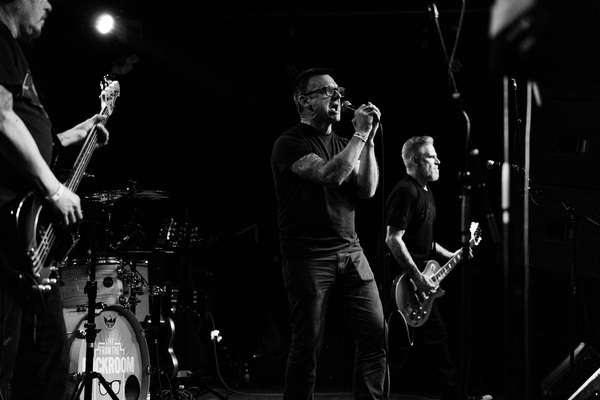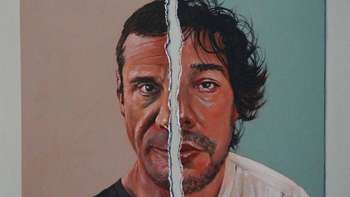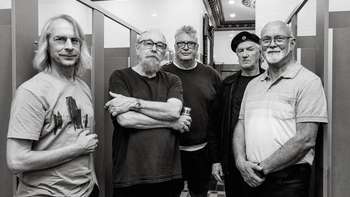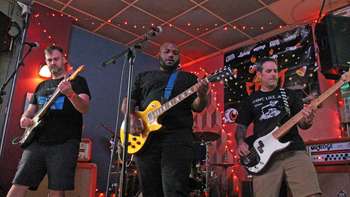There are a lot of misconceptions about the life of a musician. The old rock star image of bright lights and fast living is almost patently false. Most musicians have day jobs – and not just to pay the bills. Jobs provide new challenges, personal fulfillment and, yes, some rent or gas money. And usually when somebody is writing a new record or scheduling a tour, they have to balance that with their job.
How an artist spends their time by day will influence the creative process at night. In Don’t Quit Your Day Job, Scene Point Blank looks at how musicians split their time, and how their careers influence their music or – sometimes – how their music provides escape.
In this edition, we chat with Daryl Wilson of The Bollweevils, an emergency room doctor who has seen it all.
Scene Point Blank: What is your general career path up 'til this point and how long did it take to get here?
Daryl Wilson MD: I always wanted to be a physician since I was 7 years old. So I guess the path started way back as a kid. There was never really a question of what I wanted to do, it was always a matter of how and if I could do it. I was a sophomore in college when I was asked to participate in a medical mentoring program sponsored by The Robert Wood Johnson foundation. In the program I was able to see minority physicians practicing and that really gave me the extra boost to know I could accomplish my goal of becoming a physician. Seeing people that look like you succeed at the practice of medicine was a big positive. They all had great advice and guidance to provide on my journey to my goal.
The climb through college, medical school, residency, my attending position, and my role as EMS Medical Director has been a 33-year commitment. When I started to calculate this out it became quite apparent that most of my adult life has been dedicated to my pursuits involving medicine.
Help turn this pandemic into an endemic illness by getting vaccinated and helping to gain the confidence of those that are vaccine-hesitant.
Scene Point Blank: How does that timeline above overlap with The Bollweevils and playing music? Were you already in bands when you started your career path? Did it influence your decision or timing in any way?
Daryl Wilson, MD: I joined The Bollweevils in 1989-90. I was a freshman in college and this was the first "official" band I joined. There were some goofy things I would do with my friends that were just fun days with a tape recorder. There was a thrash metal band called Cynical Man that I kind of tried out for but didn't really click with the vibe. Cool guys but the music wasn't my style.
I always needed to do something artistic or left brain to balance out the right brain school stuff. I used to attempt to skate back in the day and skate culture influenced my choices in music, art, and recreation. Hell, I was a punk kid before I became embroiled in the day to day grind of going for my brass ring of medicine. I think that medicine had more of an influence on the timing of things I could chase with music than the other way.
Scene Point Blank: Red Scare tells me you work in an ER. There are obviously lots of specialties in medicine -- what pointed you in this specific direction?
Daryl Wilson, MD: I truly looked at the excitement, chaos, drama, teamwork, and DIY nature of the ER and found so many parallels to punk. I also wanted to be in a profession that gave me flexibility with time and movement.
I also loved that it's the most fair of all professions. I don't get to choose who I see. I am obligated to care for all people regardless of race, creed, orientation, ability to pay, age… none of that matters. It's all about being the last line between order and anarchy. You get to care for humanity and see the best and worst of us all and, in the end, go home and do it all over again the next day. It's the Punk Rock of medicine.
Scene Point Blank: These are extremely stressful times for the health care industry. How do you stay sane in 2021?
Daryl Wilson, MD: There are so many factors that have made these times in health care especially stressful. Covid-19, blowing the lid off of health care disparities and social determinants of health, the mass exodus of health care providers leading to staffing shortages, the corporate transformation of medicine and loss of physician control -- it's enough to make a grown person cry. It takes constant expenditure of energy to push back against the deluge touched on above. Some days it's not so easy to stay sane, but with the help of my family, my friends, my music, my diet, my exercise, my love of geek culture, and a little stoic philosophy, I can find a bit of energy to recharge and take on the next challenge.
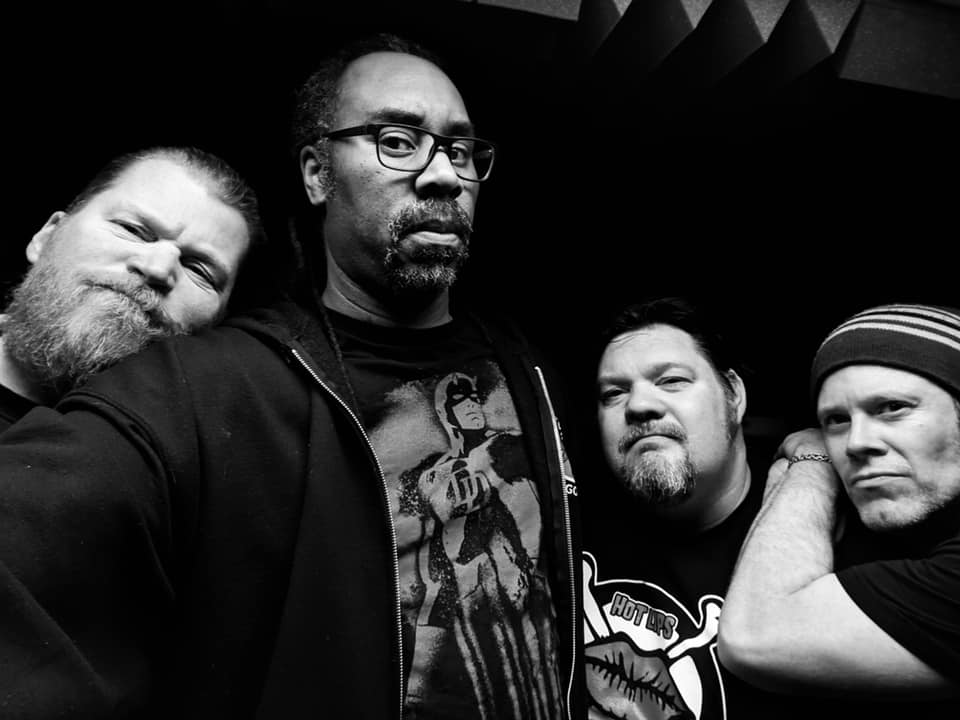
*Scene Point Blank: Even before the pandemic, ER doctors don't exactly work 9-to-5. Does the job influence how The Bollweevils operates -- meaning, does it directly affect how you write, rehearse, tour or record?
Daryl Wilson, MD: My schedule definitely has a big influence on how the band operates. We all have work and families. Those are always the priority number one when we make decisions on what, when, or how we do something. We try and rehearse every Wednesday. Sometimes the guys will get together without me if I am working. Writing is pretty organic. I have a ton of lyrics but no songs to go with those lyrics. Ken may write something or Pete may bring a lick to practice and the lyrics I wrote would never go with the song. I then will come up with something that organically fits the tune as it's written. Getting all of our schedules to fit together is a great experiment with my schedule usually being the rate-limiting step.
Scene Point Blank: What's the biggest challenge in balancing work and creating art?
Daryl Wilson, MD: Finding the time is the biggest challenge in balancing work and art. Sometimes the balance is thrown off and I can really feel it causing stress. Usually it's too much on the work side and me missing the art.
We just played Riot Fest and it was such an overwhelming feeling of replenishment. I really needed to play live music in front of a crowd. Having the pandemic inhibit the ability to showcase art has really been hard. I was surviving but didn't realize how much I needed the art to come back till we hit the stage and I felt a weight come off of my shoulders.
Ignorance lives everywhere. It's up to the enlightened to shed light and guide the lost and blind.
Scene Point Blank: Has the job ever directly affected a song? Are there any examples of this (drawing influence) on the new record that you could point out?
Daryl Wilson, MD: My influences for song ideas come from a diverse set of drivers.
My profession has influenced multiple songs we have written. [A] classic example is “John Doe” off of Stick Your Neck Out, taken from my experiences in the anatomy lab and the oil painting from Rembrandt, The Anatomy Lesson of Dr. Nicolaes Tulp, contemplating the life of the cadaver we worked on to help us understand anatomy. They had a life before, and we never think about that life. I did, and wrote about the experience.
On the upcoming LP, Essential, there is a song called “The Cutting Solution”. I wrote that after seeing so many young people with psychiatric illness and suicide attempts in the ER. We as a nation need to really get behind funding psychiatric care and look at the public health ramifications of underfunded psychiatric care.
“Liniment and Tonic” was written to talk about stress relief. Hard day: some people come home and find self-medication or go to the bar. Whatever your remedy happens to be for stress relief, the song points to an elixir of sorts that takes away the pain. Mind you, dovetailing off of my talk about psychiatric illness, excessively drinking to solve your problems doesn't end well.
Scene Point Blank: Does music ever come up with your coworkers, or even patients? If so, how?
Daryl Wilson, MD: Yeah, there are many times that patients or colleagues of mine ask about my musical endeavors. It sometimes takes me off my game when patients or their families bring it up during our encounter.
In the hospital I am not in the mindset of “let's rock and roll.” It's all about let's rule out the emergency first, and then once that's done, we can shoot the breeze about music. Sometimes it is a good icebreaker for patients. It just has to be done at the appropriate time. I might recognize a t-shirt or tattoo and I may bring up a little nugget of information that lets the patient know I am "cool," haha.
By going into the "light professions" (those that are here to care for others and pull others from the darkness), you must realize that our souls will be drained as we practice. It's up to us to refill our lights as we fight the good fight.
Scene Point Blank: Did you run into any challenges in your career path that were connected to your music, like awkward interview questions or stereotypes about punk rock?
Daryl Wilson, MD: Challenges come from all angles. Most challenges come from other people's preconceived notions about people of color, and that can fall on multiple sides. The general microaggression of racial biases, and the disbelief that Black people are in punk rock. Let me say that these are rare instances and I have never felt that my career path was ever blocked by other people's weaknesses. I have never once let someone put their value judgment on me and let it stick. Ignorance lives everywhere. It's up to the enlightened to shed light and guide the lost and blind. Most ignorant comments that come my way get deflected right back at the perpetrator with a quick quip. Many people are too cowardly to say anything to my face and wait to show their low level thinking in satisfaction surveys -- little do they know, I am one of the top box scores in patient satisfaction. There really are a few loud detractors but most people are pretty good.
Scene Point Blank: Do you meet other punk rock doctors, nurses, etc?
Daryl Wilson, MD: I have met more and more punk rock health care providers over the years. I like to believe that I was one of the early pioneers and paved the way for us to crawl out of the woodwork into the mainstream. There should be a network and place we all meet up and use our unique perspective, forged in our DIY spirit, to help solve the world's problems, Hahaha. Actually I think we should start something like this... if I only had more than 24 hours in a day.
Scene Point Blank: Have you ever had to use your professional expertise at a show, such as helping with a broken bone, stitches, car crash or anything like that?
Daryl Wilson, MD: This has happened more than I would like to have happen. Sometimes it's a person in the audience or in attendance at an event, other times, it may be a band member falling off of a stage.... ask Sensitive Pete about this... he won't remember the event due to his concussion and the alcohol. One buddy of ours, Chris the Mosher, suffered a huge scalp laceration and head injury during a GBH show. I didn't have anything to repair the laceration and he needed a head CT from his continued confusion. He stayed ‘til the end of the GBH set and then took an Uber to the hospital. For a while I did not know where he was and was concerned he went home and had succumbed to his head injury. Thankfully he did the right thing. There are so many other stories about me getting involved in a medical capacity at shows. I should start charging for the service.
Scene Point Blank: What advice would you give to others who might be interested in a career in medicine?
Daryl Wilson, MD: It's a long commitment but it's doable. Take into account the stress and make sure you have some outlet outside of medicine to give you balance. Despite the changes to the medical profession, it's still a noble and honorable task. But all in all, remember that it's still just a job. A job that requires you to care for the sick, comfort the dying, make complex decisions, and still make sure that you are caring for yourself and those closest to you. By going into the "light professions" (those that are here to care for others and pull others from the darkness), you must realize that our souls will be drained as we practice. It's up to us to refill our lights as we fight the good fight.
Scene Point Blank: Anything you'd like to add?
Daryl Wilson, MD: Thank you for the interview. Pick up our new single, “Liniment and Tonic” (out now) and make sure to get our LP when it comes out next year. Both are on our wonderful label Red Scare, and we couldn't be happier to be working with Toby!
Help turn this pandemic into an endemic illness by getting vaccinated and helping to gain the confidence of those that are vaccine-hesitant. Thank a health care provider, and please practice kindness to others. We are all we have.
